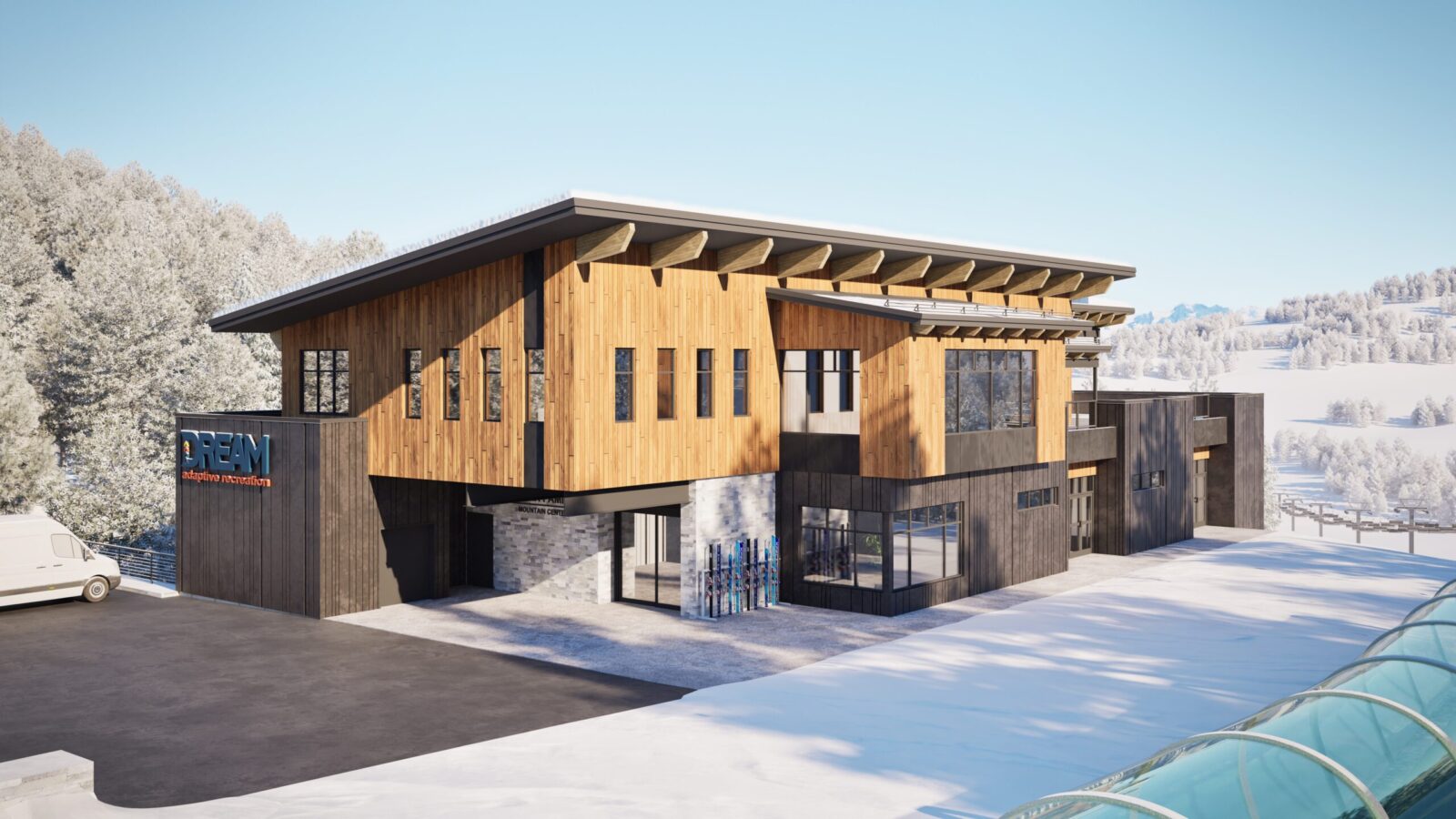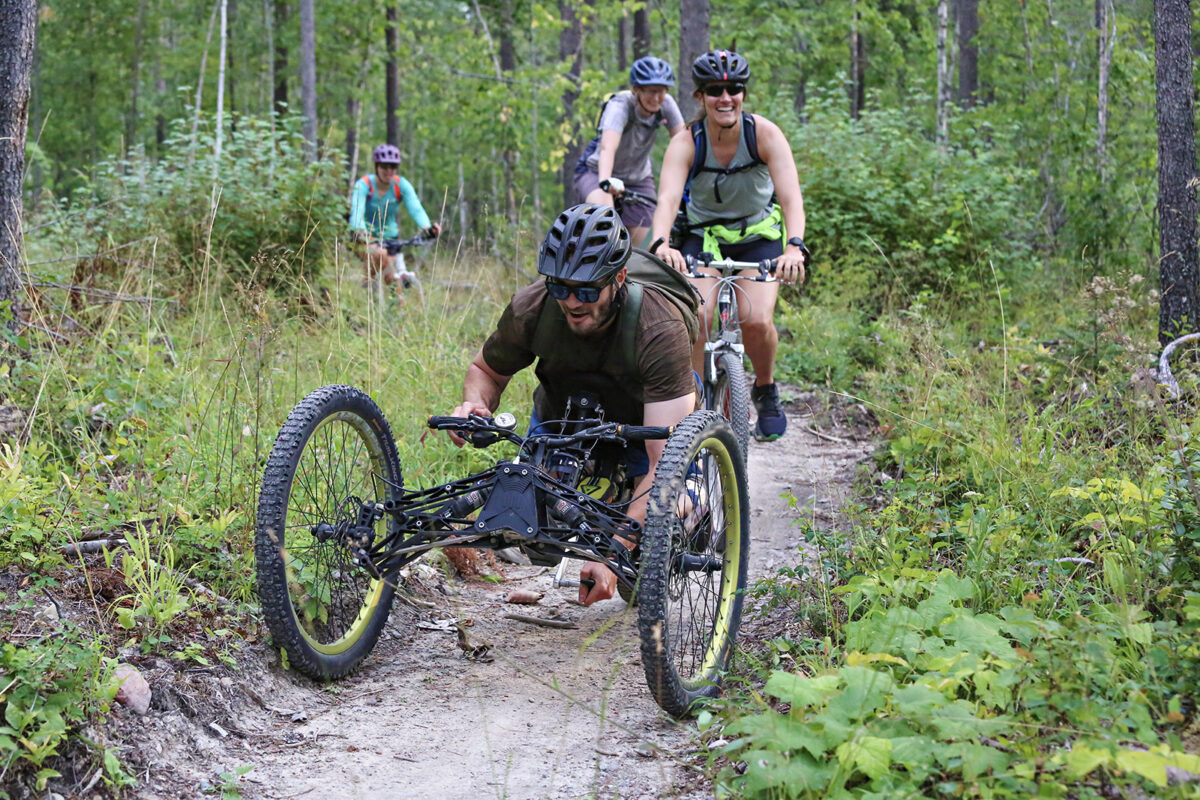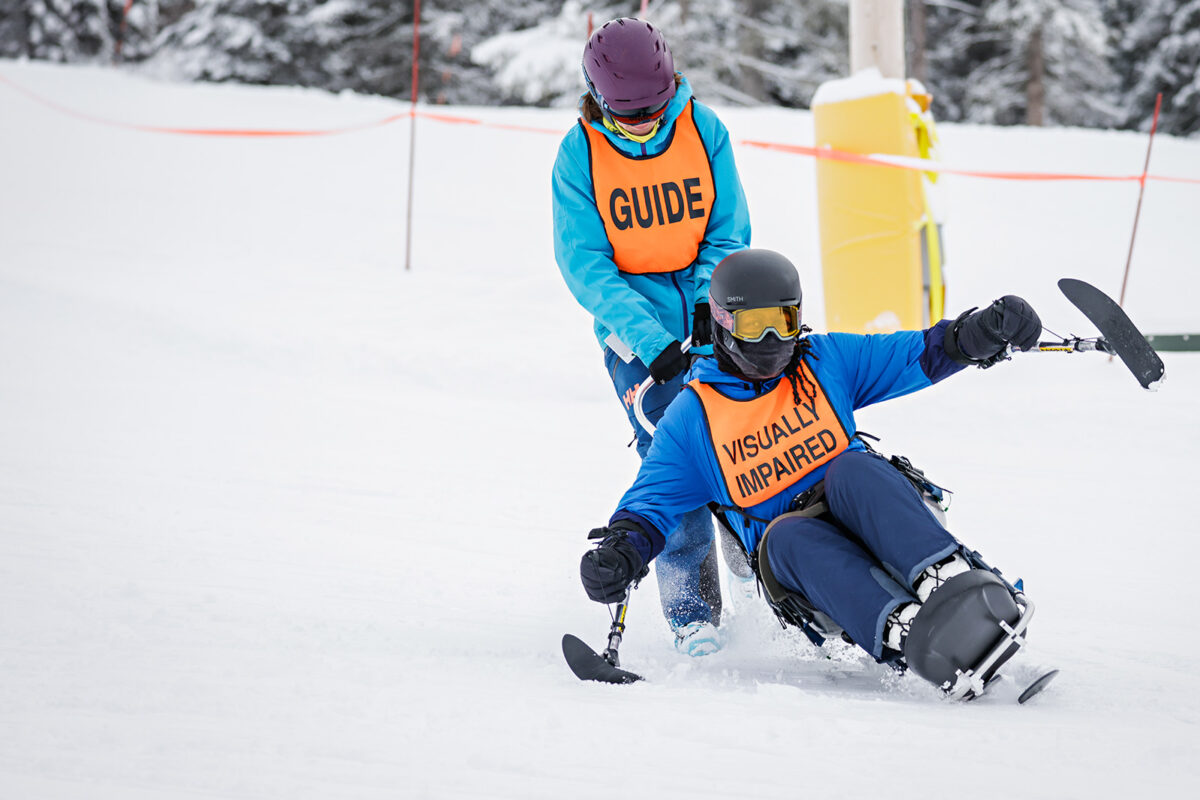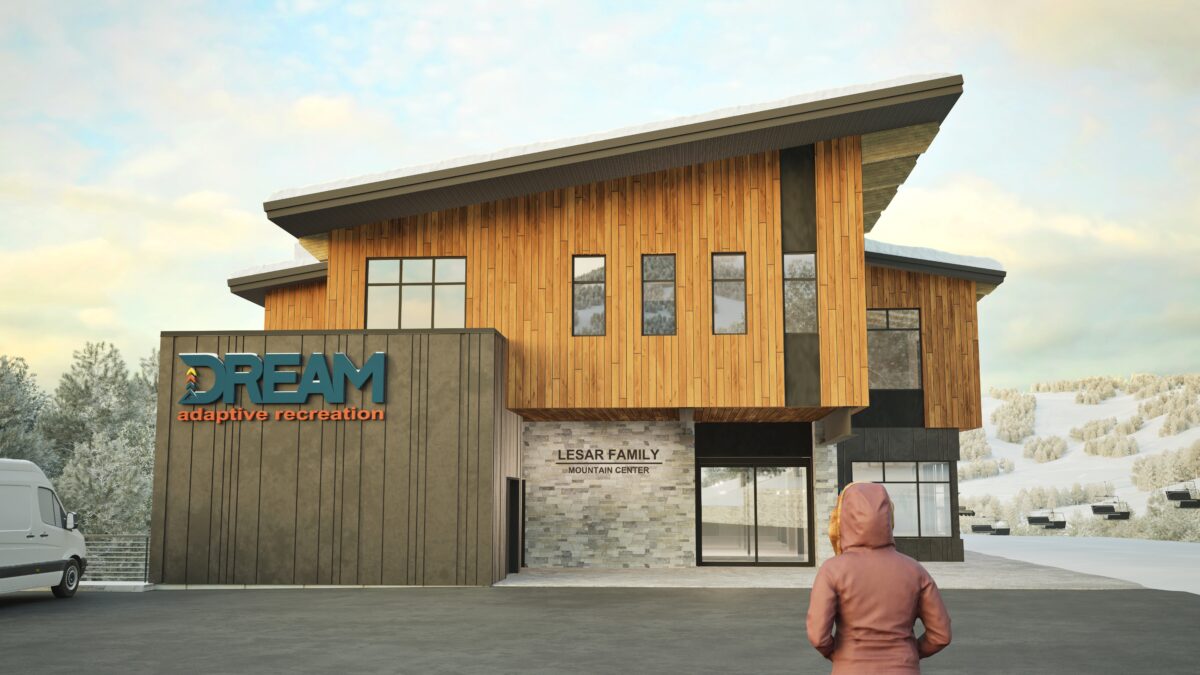DREAM Adaptive Recreation Dreams Big with New Headquarters and Operational Center on Big Mountain
A major donation by the Lesar family is the first step toward the construction of the nonprofit organization's new slopeside facility
By Micah Drew
Julie Tickle has several distinct memories from her first summer working as a program coordinator for DREAM Adaptive Recreation in 2017. One memory takes place at Whitefish’s City Beach, where Tickle was organizing an accessible paddle program for DREAM participants. A local Whitefish resident, philanthropist and former Halliburton CEO Dave Lesar, was out for his morning walk when he stopped Tickle and asked her what she was doing.
“I could tell right away by his elevated questions and the directness of his questions that he was somebody who was really interested in supporting the work we were doing,” Tickle recalled recently from the headquarters of DREAM where she is now the executive director. “The conversation evolved into a main question about what program I would like to start for DREAM if I could do anything.”
Her answer was to start a mountain biking program because of the region’s access to trails and recent advancements in technology for adaptive mountain bikes. However, adaptive bikes are prohibitively expensive for most individuals — as well as for small nonprofits like DREAM — costing tens of thousands of dollars apiece.
“If we’re looking at reducing the barriers for the people that we’re serving, the biggest one is these expensive bikes,” Tickle said. “For our the disabled population, mountain biking can look like a hike in nature, and it can also look like raging downhill biking — we want to offer the full range of opportunities. DREAM needs to get people out on dirt.”
Soon after her conversation, Tickle got a call asking for a proposal to purchase adaptive mountain bikes, and the Lesar family jumpstarted DREAM’s cycling program with three donated bikes.
It snowballed from there, Tickle said, and Dave and Sherry Lesar soon became two of DREAM’s staunchest supporters, including helping purchase an additional fleet of six bikes.
Earlier this month, DREAM announced that the Lesar family is making a major donation towards the construction of a new headquarters and operational center at Whitefish Mountain Resort on Big Mountain, which will be known as the Lesar Family Mountain Center for DREAM Adaptive Recreation.
“For me personally, they were one of my first real connections to this community and they really stepped up to the plate,” Tickle said. “As the lead donors, they are are instrumental in letting us move forward with this project we’ve been thinking about for years.”

DREAM Adaptive Recreation was founded in 1985 and for the last 39 years has provided adaptive sports opportunities to people with both cognitive and physical disabilities with the goal of empowering people with accessible outdoor recreation. Over the last 39 years DREAM has evolved into an operation supported by five year-round staff, three winter instructors and more than 180 volunteers. The organization first began offering adaptive alpine skiing programs to people with disabilities on Big Mountain and has grown to offer downhill skiing and snowboarding, Nordic skiing, biking, paddle sports, and motorized water sports. They also host retreats for out-of-town groups.
During the winter, DREAM operates out of a small shack and shed in the Spruce parking lot at Big Mountain. The small 16-by-20 foot shack doesn’t have running water or restroom facilities and only has a few ADA-compliant parking spaces in the dirt lot.
“It’s just not efficient,” Tickle said. “We meet a lot of participants in our winter programs down at the base lodge because of the restroom and changing facilities. We often have to bring equipment down to the base lodge and make a lot of trips back and forth. It’s just a lot of logistical challenges.”
Members of the DREAM staff over the years have long envisioned building a fully functional headquarters and operational center that would offer a complete mountain experience to participants in a single location. Ideally it would be the one-stop shop for both summer and winter recreational programs with a slew of accessible parking spots, slopeside access and more traditional resort amenities.
Recently, it was announced that Whitefish Mountain Resort (WMR) would donate a 0.7-acre lot in the East Village development adjacent to the ski area’s Chair 9.
Nick Polumbus, president of WMR, said there have been discussions through the years of the resort donating a parcel of land to DREAM, but locating a plot that fit all the requirements was difficult.
“It’s really hard to find a flat spot to build on a mountain,” Polumbus told the Beacon. “We pushed and we pulled and we moved around the mountain and talked things through with various engineers and architects and I think we landed on a really great location for them.”
“This is a great partnership. The organization has always been an important part of the mountain and the community,” he added.

The property sits about three-quarters of the way up the ski run served by Chair 9, offering ski-in access to beginner mountain terrain. An additional easement will offer up to 40 parking spots, at least 30 of which will be ADA-accessible, according to Tickle, who said a graded roadway will lead to the center’s front door.
“In our world, if people can’t pull right in and have a fully accessible experience out of the gate, we’ve missed the mark,” Tickle said.
The Lesar Family Mountain Center is being designed by Montana-based firm Cushing Terrell. Current renderings depict a three-story, 14,000-square-foot building that is being fully designed for use by a person with disabilities.
“Most buildings these days are built to accommodate a wheelchair, but we could have 10 people in wheelchairs at the same time in the center, so we want a lot of space so they can all navigate and we can navigate with our equipment,” Tickle said. “We’re playing around with the design to be subtle but inclusive and supportive in every way we can.”
The Mountain Center will include an open community room with an adjacent kitchen; a slopeside viewing room that doubles as a conference room; staff offices; a tech shop; multiple participant group rooms; athlete day lockers; staff locker rooms and break rooms; non-gendered accessible restrooms; two small sensory rooms; and additional storage space for summer and winter equipment.
The center’s location along Chair 9 will allow participants to ski right onto beginner terrain in the winter, while offering immediate access to biking trails for summer programs.
In addition, Tickle said DREAM will be raising money to build and install a magic carpet lift right outside the Mountain Center.
“We’ve seen our volume grow in recent years and have had to turn people away because we reach capacity,” Tickle said. “With the new center, we hope to grow our staff, grow our volunteer base and grow our programs so we never have to put restrictions on programming.”
With early fundraising anchored by the Lesar’s major gift, Tickle said DREAM is planning to officially launch its capital campaign to fundraise the estimated $12-to-$15 million cost of the Mountain Center in early 2025. If things go smoothly, they could break ground on the new building next summer, with plans to be operational in 2027.
“Next year is our 40th birthday, so the timing could be very serendipitous,” Tickle said. “If we could celebrate 40 years of adaptive recreation in the Flathead and do a groundbreaking ceremony at the same time, that would be pretty cool.”
